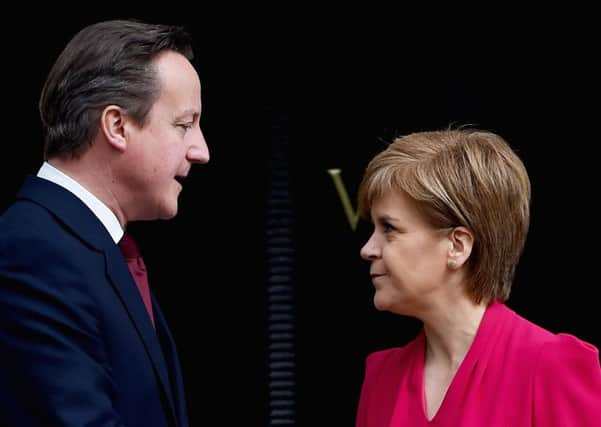Tom Peterkin: Will Holyrood power talks have happy ending?


Therefore to suggest that there has been a distinct absence of rays of sunshine beaming forth from SNP politicians in recent years risks the wrath of committed Nationalists.
Nevertheless, it not unreasonable for Nicola Sturgeon’s opponents to call for an end to the “grievance agenda” that has proved so fruitful for the Nationalists.
Advertisement
Hide AdAdvertisement
Hide AdThat is what David Cameron did yesterday at Prime Minister’s Questions when he spoke of his desire to halt the SNP’s propensity to blame Westminster for Scotland’s woes.
With the UK and Scottish Governments struggling to make progress on talks to bring more powers to Holyrood, Cameron’s frustration at the inability to come to a deal on the financial arrangements of the transfer was clear.
“No-one is keener on agreement than me,” he said. “I want the Scottish National Party here and in Holyrood to have to start making decisions, which taxes are you going to raise, what are you doing to do with benefits. I want to get rid of frankly this grievance agenda and let you get on with a governing agenda and then we can see what you’re made of.”
Since the No vote in the 2014 referendum, the pro-Union parties have seen the transfer of more powers to Holyrood as the way of achieving a constitutional settement that will move Scottish politics beyond a blame game.
But as the trickiness of the inter-governmental talks indicate, there are difficulties for those who want to see political debate dominated by the use of powers rather than complaints about the lack of them. No-one thought the transfer of Smith Commission powers to Holyrood would be straight-forward. But the complexity of deliving a fiscal framework to underpin the package of taxes and benefits coming to Scotland has seen the talks get bogged down in the process of actually delivering the change.
Over the years the SNP has displayed a mastery of using arguments about process to its political advantage. In this instance, the SNP is making the political weather by raising fears that Scotland will be “short-changed” to the tune of £3 billion over the next decade by cuts to the block grant proposed by the Treasury.
The UK government, on the other hand, is frustrated that a party, which aspires for more powers, appears reluctant to take on the financial risks which accompany greater autonomy over taxation.
This week deadlines have slipped and the two governments are still some way from a deal, despite both sides talking up their ambitions to come to agreement.
Advertisement
Hide AdAdvertisement
Hide AdOn Tuesday there appeared to be signs of a thaw in the permafrost when Nicola Sturgeon indicated the Scottish Government would be prepared to address UK government concerns that Scotland would continue to benefit from tax rises south of the border.
Even so, Sturgeon and Swinney must be quietly calculating whether it is in their political interests to spin this one out until after the election. Going into an election complaining about being hard done by Westminster is familiar and successful political territory for the SNP. Cameron and co, however, will be hoping for something resembling a ray of sunshine from Sturgeon.